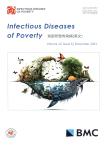Impact of 1,7-malaria reactive community-based testing and response(1,7-mRCTR)approach on malaria prevalence inTanzania
作者机构:Department of Global Health and Population Harvard T.H. Chan School of Public Health Boston USA Chinese Center for Disease Control and Prevention National Institute of Parasitic Diseases Shanghai People’s Republic of China School of Global Health Chinese Center for Tropical Diseases Research Shanghai Jiao Tong University School of Medicine Shanghai People’s Republic of China Chinese Center for Tropical Diseases Research Shanghai People’s Republic of China WHO Collaborating Centre for Tropical Diseases Shanghai People’s Republic of China Ifakara Health Institute Dar es Salaam United Republic of Tanzania Africa Academy for Public Health Dar es Salaam Tanzania Muhimbili University of Health and Allied Sciences Dar es Salaam Tanzania National Center for International Research on Tropical Diseases Ministry of Science and Technology Shanghai People’s Republic of China Global Malaria Programme World Health Organization Geneva Switzerland Bentley University Waltham USA Vanke School of Public Health Tsinghua University Beijing People’s Republic of China School of Public Health University of Alabama at Birmingham Birmingham USA The Pan-African Mosquito Control Association (PAMCA) KEMRI Headquarters Nairobi Kenya
出 版 物:《Infectious Diseases of Poverty》 (贫困所致传染病(英文))
年 卷 期:2023年第12卷第6期
页 面:103-104页
核心收录:
学科分类:1004[医学-公共卫生与预防医学(可授医学、理学学位)] 1002[医学-临床医学] 1001[医学-基础医学(可授医学、理学学位)] 100201[医学-内科学(含:心血管病、血液病、呼吸系病、消化系病、内分泌与代谢病、肾病、风湿病、传染病)] 10[医学]
基 金:supported by Bill&Melinda Gates Foundation(OPP1198779 and OPP1213975)
主 题:Malaria Surveillance and response Incidence rate Community-health worker Health facility Communitybased testing and treatment 1,7-mRCTR Tanzania
摘 要:Background Progress in malaria control has stalled in recent years and innovative surveillance and response approaches are needed to accelerate malaria control and elimination eforts in endemic areas of ***‑ing on a previous China-UK-Tanzania pilot study on malaria control,this study aimed to assess the impact of the 1,7-malaria Reactive Community-Based Testing and Response(1,7-mRCTR)approach implemented over two years in three districts of *** The 1,7-mRCTR approach provides community-based malaria testing via rapid diagnostic tests and treat‑ment in villages with the highest burden of malaria incidence based on surveillance data from health *** used a diference-in-diferences quasi-experimental design with linear probability models and two waves of crosssectional household surveys to assess the impact of 1,7-mRCTR on malaria *** conducted sensitivity analyses to assess the robustness of our results,examined how intervention efects varied in subgroups,and explored alternative explanations for the observed *** Between October 2019 and September 2021,244,771 community-based malaria rapid tests were com‑pleted in intervention areas,and each intervention village received an average of 3.85 rounds of *** prevalence declined from 27.4%at baseline to 11.7%at endline in the intervention areas and from 26.0%to 16.0%in the control areas.1,7-mRCTR was associated with a 4.5-percentage-point decrease in malaria prevalence(95%confdence interval:−0.067,−0.023),equivalent to a 17%reduction from the *** Rufji,a district characterized by lower prevalence and where larviciding was additionally provided,1,7-mRCTR was associated with a 63.9%decline in malaria *** The 1,7-mRCTR approach reduced malaria *** implementation interruptions due to the COVID-19 pandemic and supply chain challenges,the study provided novel evidence on the efectiveness of community-based reactive approache



